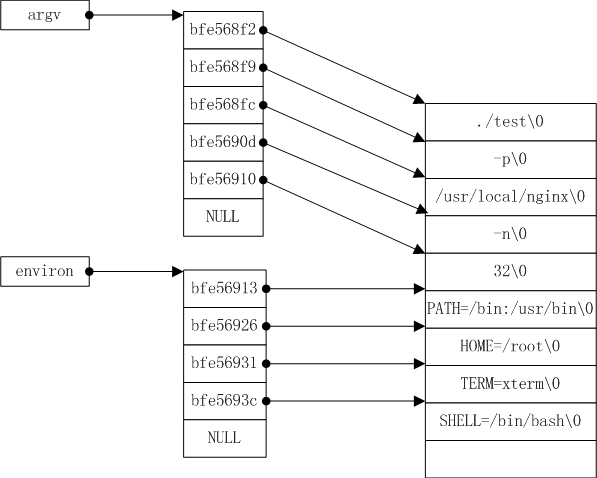Linux批改进程名称(setproctitle())
日期:2014-05-16 浏览次数:21025 次
Linux修改进程名称(setproctitle())
1.1 介绍
每一个c程序都有个main函数,作为程序启动入口函数。main函数的原型是int main(int argc , char *argv[]);其中argc表示命令行参数的个数;argv是一个指针数组,保存所有命令行字符串。Linux进程名称是通过命令行参数argv[0]来表示的。
Linux 还有环境变量参数信息,表示进程执行需要的所有环境变量信息。通过全局变量
Char **environ;可以访问环境变量。
命令行参数argv和环境变量信息environ是在一块连续的内存中表示的,并且environ紧跟在argv后面。如下图:

1.2 验证argv和environ执行连续内存的测试程序
1 #include <stdio.h>
2 #include <string.h>
3
4 extern char **environ;
5 int main(int argc , char *argv[])
6 {
7 int i;
8
9 printf("argc:%d\n" , argc);
10
11 for (i = 0; i < argc; ++i){
12 printf("%x\n" , argv[i]);
13 printf("argv[%d]:%s\n" , i , argv[i]);
14 }
15
16 printf("evriron=%x\n" , environ[0]);
17
18 return 0;
19 }
root@VM-Ubuntu203001:~/test#gcc -o test main.c
root@VM-Ubuntu203001:~/test#./test -p /usr/local/nginx -n 32
argc:5
bfa0c8f2
argv[0]:./test
bfa0c8f9
argv[1]:-p
bfa0c8fc
argv[2]:/usr/local/nginx
bfa0c90d
argv[3]:-n
bfa0c910
argv[4]:32
evriron=bfa0c913
1.3 修改进程名称
按理说,修改进程名称,只需要修改argv[0]指向的内存的值为所需要的值即可。但是当我们要修改的值超过argv[0]所指向的内存空间大小时,再这样直接修改,就会覆盖掉一部分argv[1]的值,因为从上面的图中,很容易就可以看出。
这时候,该怎么做呢?
1、必须重新分配一块连续的内存空间,把argv和environ的参数都复制到新的空间。
2、修改argv[0]为所需要修改的值。
1.4 Nginx的做法
* To change the process title in Linux andSolaris we have to set argv[1]
* to NULL and to copy the title to the sameplace where the argv[0] points to.
* However, argv[0] may be too small to hold anew title. Fortunately, Linux
* and Solaris store argv[] and environ[] oneafter another. So we should
* ensure that is the continuous memory andthen we allocate the new memory
* for environ[] and copy it. After this we could use the memory starting
* from argv[0] for our process title.
*
* The Solaris's standard /bin/ps does not showthe changed process title.
* You have to use "/usr/ucb/ps -w"instead. Besides, the UCB ps does not
* show a new title if its length less than theorigin command line length.
* To avoid it we append to a new title theorigin command line in the
* parenthesis.
*/
extern char **environ;
static char *ngx_os_argv_last;
ngx_int_t
ngx_init_setproctitle(ngx_log_t *log)
{
u_char *p;
size_t size;
ngx_uint_t i;
size = 0;
for (i = 0; environ[i]; i++) {
size+= ngx_strlen(environ[i]) + 1;
}
p = ngx_alloc(size, log);
if (p == NULL) {
return NGX_ERROR;
}
/*
这是为了找出argv和environ指向连续内存空间结尾的位置,为了能处理argv[i]被修改后,指向非进程启动时所分配的连续内存,而采用了下面的算法。但是实际上,这样还是处理不了这种情况。仅仅是个人愚见!!!
*/
ngx_os_argv_last= ngx_os_argv[0];
for (i = 0; ngx_os_argv[i]; i++) {
if (ngx_os_argv_last == ngx_os_argv[i]) {
ngx_os_argv_last= ngx_os_argv[i]+ ngx_strlen(ngx_os_argv[i]) + 1;
}
}
for (i = 0; environ[i]; i++) {
if (ngx_os_argv_last == environ[i]) {
size= ngx_strlen(environ[i]) + 1;
ngx_os_argv_last= environ[i]+ size;
ngx_cpystrn(p, (u_char *) environ[i], size);
environ[i] = (char *) p;
p+= size;
}
}
ngx_os_argv_last--;
return NGX_OK;
}
void
ngx_setproctitle(char *title)
{
u_char *p;
#if (NGX_SOLARIS)
ngx_int_t i;
size_t size;
#endif
ngx_os_argv[1]= NULL;
p = ngx_cpystrn((u_char*) ngx_os_argv[0], (u_char*) "nginx: ",
ngx_os_argv_last- ngx_os_argv[0]);
p = ngx_cpystrn(p, (u
免责声明: 本文仅代表作者个人观点,与爱易网无关。其原创性以及文中陈述文字和内容未经本站证实,对本文以及其中全部或者部分内容、文字的真实性、完整性、及时性本站不作任何保证或承诺,请读者仅作参考,并请自行核实相关内容。
